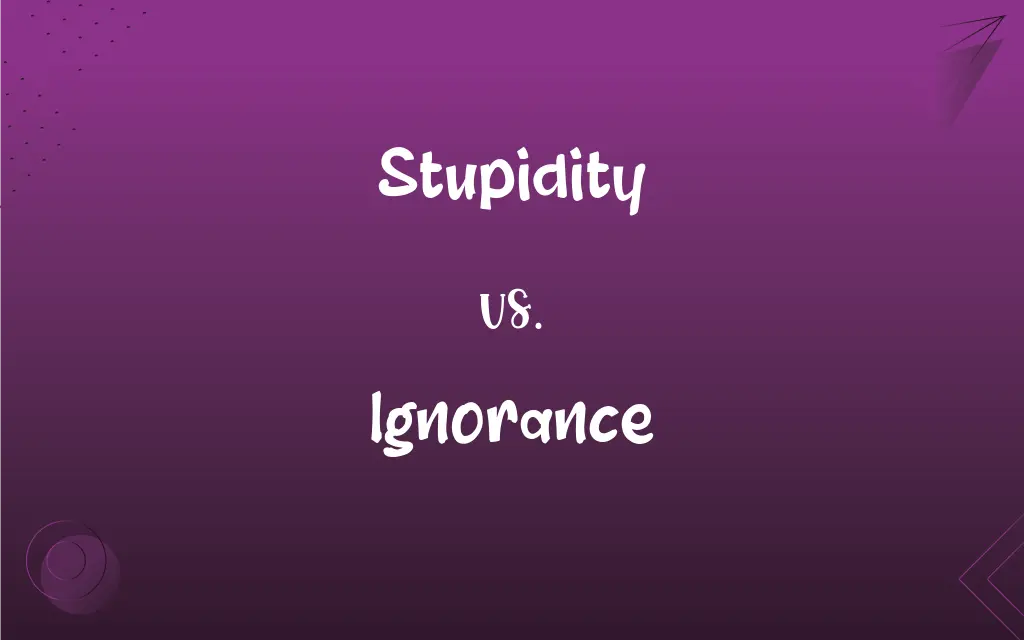Stupidity vs. Ignorance: What's the Difference?
Edited by Aimie Carlson || By Harlon Moss || Updated on November 21, 2023
Stupidity is a lack of intelligence or common sense; ignorance is a lack of knowledge or awareness.

Key Differences
Stupidity refers to a lack of intelligence or understanding, often implying a natural limitation in intellectual capacity or judgment. It suggests a certain level of incompetence in reasoning or making logical decisions. Ignorance, on the other hand, is simply the absence of knowledge or information about something. It does not necessarily reflect on a person's intellectual capabilities but rather on their state of being uninformed or unaware.
Stupidity often carries a more derogatory connotation, implying an inability to learn from mistakes or to comprehend relatively simple concepts. Ignorance, while it can be used pejoratively, is more neutral, suggesting that the lack of knowledge could be remedied through education or experience.
In some contexts, stupidity is seen as an inherent trait, something that is difficult or impossible to change. Ignorance, conversely, is often viewed as a temporary state; someone who is ignorant about a subject can become knowledgeable through learning.
Stupidity is sometimes associated with foolish actions, imprudent decisions, or a general lack of wisdom. It is not just a lack of knowledge but also a lack of judgment. Ignorance, however, is not inherently linked to poor decision-making; an ignorant person may simply lack certain information.
While stupidity often implies a broader deficiency in intelligence or common sense, ignorance is more specific, relating to a lack of knowledge in a particular area. One can be highly intelligent yet ignorant about many topics, whereas stupidity suggests a more pervasive limitation in understanding.
ADVERTISEMENT
Comparison Chart
Definition
Lack of intelligence or common sense
Lack of knowledge or awareness
Connotation
Often derogatory
More neutral
Changeability
Seen as inherent, difficult to change
Often temporary, can be remedied
Association
Linked with poor judgment and foolishness
Simply uninformed, not necessarily unwise
Scope
Broader, implies general deficiency
Specific to certain knowledge or information
ADVERTISEMENT
Stupidity and Ignorance Definitions
Stupidity
Natural limitation in intellectual capacity.
The character's endearing stupidity made him lovable.
Ignorance
Lack of knowledge or information.
Her ignorance about politics was surprising.
Stupidity
Lack of intelligence.
His decision was criticized as sheer stupidity.
Ignorance
State of being uninformed.
His ignorance of the law did not excuse his actions.
Stupidity
Inability to understand basic concepts.
Stupidity prevented him from grasping the instructions.
Ignorance
Absence of awareness about something.
The ignorance about global issues is alarming.
Stupidity
Poor judgment or common sense.
It was stupidity to drive in such a storm.
Ignorance
Unfamiliarity with a particular topic.
Despite his intelligence, he showed ignorance in art history.
Stupidity
Foolishness in actions or decisions.
The prank was an act of pure stupidity.
Ignorance
Condition of being uneducated in a field.
His ignorance in mathematics was evident.
Stupidity
The quality or condition of being stupid.
Ignorance
The condition of being uneducated, unaware, or uninformed.
Stupidity
A stupid act, remark, or idea.
Ignorance
The condition of being uninformed or uneducated; lack of knowledge or information.
She shows total ignorance about the topic at hand.
Stupidity
(uncountable) The property of being stupid.
I suppose you can put it down to gross stupidity, but that's not much of an excuse.
Ignorance
Sins committed through ignorance.
Stupidity
(countable) An act that is stupid.
Jimmy's stupidity cost him his car.
Ignorance
The condition of being ignorant; the lack of knowledge in general, or in relation to a particular subject; the state of being uneducated or uninformed.
Ignorance is the curse of God,Knowledge the wing wherewith we fly to heaven.
Stupidity
The quality or state of being stupid; extreme dullness of perception or understanding; insensibility; sluggishness.
Ignorance
A willful neglect or refusal to acquire knowledge which one may acquire and it is his duty to have.
Stupidity
Stupor; astonishment; stupefaction.
A stupidityPast admiration strikes me, joined with fear.
Ignorance
The lack of knowledge or education
Stupidity
A poor ability to understand or to profit from experience
Stupidity
A stupid mistake
FAQs
Can ignorance be fixed?
Yes, through learning and gaining information.
What is stupidity?
A lack of intelligence or common sense.
What is ignorance?
A lack of knowledge or awareness.
Can a smart person be ignorant?
Yes, if they lack information in certain areas.
Is stupidity always permanent?
Often perceived as such, but it can be subjective.
Are stupidity and ignorance interchangeable?
No, they imply different things.
Does stupidity affect learning ability?
It can, particularly in grasping complex concepts.
Can a lack of experience be considered ignorance?
Yes, in the sense of not having knowledge about something.
Is ignorance always a bad thing?
Not necessarily; it can be simply a lack of exposure.
Can education cure stupidity?
It can help, but stupidity often implies a deeper limitation.
Is ignorance the same as being uneducated?
Not exactly; one can be educated but still ignorant in some areas.
Can ignorance be intentional?
Yes, sometimes people choose not to know.
Can ignorance lead to poor decisions?
Potentially, if crucial information is missing.
Is stupidity a choice?
Generally, it’s not seen as a choice.
Can stupidity be humorous?
In certain contexts, like comedy, it can be.
Is everyone ignorant about something?
Yes, no one knows everything.
Do stupidity and ignorance influence each other?
They can; lack of knowledge can lead to poor judgments.
How does society view ignorance?
Often negatively, but it’s sometimes seen as fixable.
Is it insulting to call someone ignorant?
It can be, depending on context and intention.
Can ignorance be bliss?
In some situations, not knowing can be preferable.
About Author
Written by
Harlon MossHarlon is a seasoned quality moderator and accomplished content writer for Difference Wiki. An alumnus of the prestigious University of California, he earned his degree in Computer Science. Leveraging his academic background, Harlon brings a meticulous and informed perspective to his work, ensuring content accuracy and excellence.
Edited by
Aimie CarlsonAimie Carlson, holding a master's degree in English literature, is a fervent English language enthusiast. She lends her writing talents to Difference Wiki, a prominent website that specializes in comparisons, offering readers insightful analyses that both captivate and inform.






































































